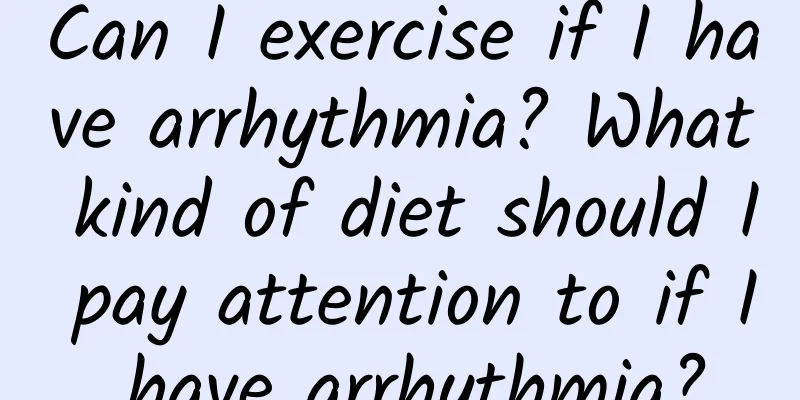Can I exercise if I have arrhythmia? What kind of diet should I pay attention to if I have arrhythmia?

|
Arrhythmia is an abnormal heartbeat frequency, usually accompanied by chest tightness, shortness of breath, palpitations and other symptoms. So in this case, are there any effects or contraindications for patients with arrhythmia to exercise? Do they need to avoid certain foods? Can I exercise if I have arrhythmia?There are many types of arrhythmias, and they are classified differently in different ways. There are probably several situations where arrhythmias cause inability to exercise: One is exercise-induced arrhythmia, which occurs when the patient is active, such as premature beats and ventricular tachycardia after activity. The most serious of these is exercise-induced sudden death, which is a fatal arrhythmia after heavy-load activity. If the patient is of this type, most patients need to exercise less or even stop exercising. One is the inability to move due to arrhythmia combined with heart disease, such as patients with arrhythmia-induced cardiomyopathy, or arrhythmia caused by various cardiomyopathies and severe heart failure. Such patients need to reduce exercise, or exercise moderately under the doctor's advice. One is arrhythmia combined with related diseases that make it impossible to exercise. For example, if the patient has common diseases that make it impossible to exercise, such as hypoglycemia or hypokalemia, he or she needs to exercise only under the doctor's advice or after the disease is corrected. Of course, there are other types of people who cannot exercise, but most arrhythmias that are not fatal should basically be able to exercise. It’s just that the degree of exercise needs to be strictly controlled. What should I pay attention to when I have arrhythmia?Most arrhythmias are not related to diet. Those who need medication should take it on time, and those who need surgery should have surgery. In short, fast arrhythmias can be treated with medication or surgery. Chronic fast arrhythmias usually require pacemaker treatment depending on the situation, and there is no medication. As a general rule, even if the heart beats fast, you should try to use medication or surgery to reduce the heart rate to normal. If the heart beats slowly, and if there is any danger, you will need to add a pacemaker. Most arrhythmias are not related to diet. Ensure a healthy diet, such as staying away from tobacco and alcohol, eating a low-salt, low-fat, low-sugar diet, eating more vegetables and fruits, increasing omnivorous foods, eating less fatty red meat, and meat mainly poultry and fish. However, there are two types of arrhythmias that need to be specifically pointed out, such as those caused by hypokalemia, which require potassium supplementation and the addition of foods with higher potassium content on top of medication, and most plant foods contain higher potassium. These are diet-related arrhythmias. Some foods can enhance the anticoagulant effect of warfarin, such as garlic and warfarin can enhance the anticoagulant effect; grapefruit contains coumarin compounds to enhance the anticoagulant effect; mango and warfarin can also enhance its anticoagulant effect. What to do if you discover an arrhythmiaThe most important thing is not the arrhythmia itself, but to find out the cause of the arrhythmia. Is it a heart problem such as coronary heart disease, hypertensive heart disease, myocarditis, or an extra-cardiac problem such as hyperthyroidism, or is it just simple anxiety, tension, or overwork? The key is to treat the cause. Secondly, symptomatic treatment If the heart beats too fast, we need to use drugs to slow it down. If the heart beats too slowly and is difficult to correct, a pacemaker may need to be installed. Various types of premature beats can be controlled with drugs, and some people can also be treated with radiofrequency ablation surgery. In short, different types of arrhythmias require different treatment strategies. Clinically, for most patients, arrhythmias have no obvious effect on the patient's own heart function. Therefore, when the attacks are relatively rare, there will be no problem even if there is no targeted treatment. Although it should be taken seriously, there is no need to worry too much about it. |
<<: Why is Xiaomi air conditioner cheaper than Gree? Why is Xiaomi air conditioner cheaper?
>>: What tests are done for arrhythmia? Is arrhythmia a fast or slow heartbeat?
Recommend
Signs of the end of a girl's voice change
Voice is something that each of us has. It has it...
How to take care of your stomach if you have a bad stomach?
We often hear that some people have chronic gastr...
What to do if a woman has a headache during the confinement period
Confinement is a very important stage for women, ...
Several treatments for menopausal syndrome
We know that menopausal syndrome is a symptom tha...
Pregnant women have frequent bowel movements
Since a woman's body will undergo great chang...
Changes in leucorrhea during early pregnancy
In the early stages of pregnancy, many pregnant m...
What to do if there is bleeding below
If you find yourself bleeding from your vagina, y...
What is the reason for the sudden decrease of vaginal discharge?
What is the reason for the sudden reduction of le...
What does KFC contactless delivery mean? How does KFC contactless delivery work?
Due to the epidemic, many people dare not go out ...
How to produce milk quickly and abundantly after caesarean section
When women give birth, they can have either a nat...
What is the correct way to protect the fetus in late pregnancy?
When our female friends are in the late stage of ...
What to do if your menstrual flow is light at 43 years old
All of my female friends should know that people’...
What are the dangers of having vaginitis during pregnancy?
Vaginitis is a common gynecological disease in wo...
How to stay healthy when the flu "storm" strikes? Here are some prevention tips!
Recently, respiratory diseases such as influenza ...









